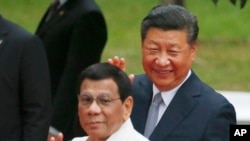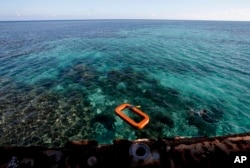ປະທານາທິບໍດີ ໂຣດຣິກໂກ ດູເຕີເຕ (Rodrigo Duterte) ຂອງຟີລິບປິນ ຈະນຳເອົາບັນຫາຄວາມຂັດແຍ້ງກ່ຽວກັບເຂດແດນທາງທະເລທີ່ມີຄວາມຫລໍ່ແຫລມນັ້ນ ຂຶ້ນມາສົນທະນາກັບຄູ່ຕຳແໜ່ງຈີນ ໃນເດືອນນີ້ ເພື່ອຈະໃຫ້ໄດ້ຮັບການເອື້ອອຳນວຍຜົນປະໂຫຍດທາງເສດຖະກິດຫລາຍຂຶ້ນ, ອີງຕາມຜູ້ສັງເກດ ການຫລາຍທ່ານ.
ທ່ານ ດູເຕີເຕ (Duterte) ທີ່ໄດ້ເຮັດໃຫ້ມີຄວາມສະຫງົບກັບຈີນໃນປີ 2016 ໂດຍການເອົາບັນຫາຂັດແຍ້ງດັ່ງກ່າວອອກໄປນັ້ນ ເວົ້າໃນວັນທີ 8 ສິງຫາ ທີ່ຜ່ານມານີ້ ວ່າ ທ່ານຈະໄດ້ສົນທະນາກັບປະທານສີ ຈິ້ນຜິງຂອງຈີນ ກ່ຽວກັບ ການຕັດສິນຂອງສານໄກ່ເກ່ຍຂອງໂລກທີ່ດຳເນີນໄປເປັນເວລາ 3 ປີ ທີ່ໃຫ້ມະນີລາຊະນະ ແລະຄວາມເປັນໄປໄດ້ທີ່ຈະມີກົດປະຕິບັດທາງທະເລຂອງຫລາຍປະເທດ, ອີງຕາມຂໍ້ຄວາມທີ່ຂຽນຢູ່ໃນເວັບໄຊທ໌ ຂອງຫ້ອງການປະທານາທິບໍດີ.
ຈີນແລະຟີລິບປິນ ໄດ້ມີການຂັດແຍ້ງກັນກ່ຽວກັບເຂດນ້ຳແດນດິນ ຕໍ່ຫລາຍພາກສ່ວນໃນທະເລຈີນໃຕ້, ທີ່ມີເນື້ອທີ່ 3 ລ້ານ 5 ແສນຕາລາງກິໂລແມັດ ແລະມີຄຸນຄ່າໃນດ້ານການປະມົງ ແລະບໍ່ນຳມັນສຳຮອງນັ້ນ. ປະເທດໃນເຂດເອເຊຍຕາເວັນອອກສຽງໃຕ້ອື່ນໆ ແລະໄຕ້ຫວັນກແມ່ນໄດ້ອ້າງເອົາກຳມະສິດທັງໝົດ ຫລື ບາງສວ່ນຂອງເຂດທະເລດຽວກັນນັ້ນ.
ຈີນໄດ້ເປັນຜູ້ນຳພາທາງດ້ານການທະຫານ ແລະເທັກໂນໂລຈີ ມາໄດ້ຫລາຍກວ່າ ທົດສະວັດນຶ່ງແລ້ວ ໂດຍການຖົມດິນເພື່ອເຮັດໃຫ້ເປັນເກາະດອນນ້ອຍໆ ແລະເອົາຍຸດໂທປະກອນທາງທະຫານໄປໄວ້ໃນເກາະເຫລົ່ານັ້ນບາງແຫ່ງ. ປະເທດດັ່ງກ່າວໄດ້ເຮັດໃຫ້ຄວາມເຄັ່ງຕຶງກັບພວກປະເທດອື່ນທີ່ໄດ້ອ້າງເອົາກຳມະສິດ ຜ່ອນຄາຍລົງໂດຍການສະເໜີການຊ່ວຍເຫລືອໃນການລົງທຶນ ແລະການພັດທະນາໃຫ້. ທ່ານ ດູເຕີເຕ ຢາກໄດ້ການພັດທະນານັ້ນຫລາຍກວ່າໃນປັດຈຸບັນນີ້, ຕາມການສະເໜີຂອງບັນດານັກຄົ້ນຄວ້າ.
ອ່ານຂ່າວນີ້ເພີ້ມເປັນພາສາອັງກິດຢູ່ລຸ່ມນີ້
Philippine President Rodrigo Duterte will bring up issues surrounding a touchy maritime sovereignty dispute with his Chinese counterpart this month to win more economic favors, observers predict.
Duterte, who made peace with China in 2016 by setting aside the dispute, said Aug. 8 that he would discuss with Chinese President Xi Jinping a 3-year-old World Court arbitral tribunal ruling in Manila's favor and the prospects for a multicountry maritime code of conduct, the presidential office website says.
China and the Philippines dispute sovereignty over parts of the South China Sea, a 3.5 million-square-kilometer waterway valued for fisheries and fossil fuel reserves. Three other Southeast Asian countries and Taiwan claim all or parts of the same sea.
China has taken a military and technological lead over the past decade by reclaiming land to grow out small islets and place military equipment on some. It has eased tensions with other claimants by offering investment and development aid. Duterte wants more of that now, scholars suggest.
"It might just be as a takeoff point for other issues and concerns that they might want to raise," said Jay Batongbacal, international maritime affairs professor at the University of the Philippines. "Maybe to press for faster action on pending promises made by China for infrastructure assistance and other agreements."
As the South China Sea "is becoming a very big issue," Duterte said via the presidential office website he expected to launch talks without getting into whose sovereignty claim was stronger. The arbitration court ruled against the legal basis for China's claim to about 90% of the sea. Duterte's predecessor filed the arbitration in 2013.
Over the past two years, China and the Association of Southeast Asian Nations, which counts the Philippines as one of its 10 members, have been hashing out a code of conduct aimed at preventing accidents at sea without resolving sovereignty issues. China had resisted before 2017.
"So, I'd talk about the arbitral ruling itself and then the code of conduct," Duterte said via his office's website. "I'd talk first about jurisdiction, the code of conduct, and the exploitation of the natural resources of my country, since as far as I'm concerned, we own it. So that is my position."
Both sides might say they look forward to a code, Batongbacal said, but neither is likely to yield ground on the maritime dispute otherwise. China does not recognize the arbitral court ruling, but it has talked with the Philippines about joint exploration for undersea oil or gas in the disputed sea.
Bid for more aid
China stepped up trade and development support, on its own, for much of Southeast Asia after losing the arbitration. In 2016, Xi pledged $24 billion for the Philippines, which under Duterte was about to kick off a $169 billion nationwide infrastructure renewal campaign.
About $4.7 billion of that pledge had reached the Philippines as of February 2019, to be used for four projects, the Southeast Asian country's socioeconomic planning secretary, Ernesto Pernia, was quoted saying. Common Filipinos have complained of not seeing enough of the amount pledged.
Other countries sometimes use sensitive issues to push China toward raising aid offers, said Stephen Nagy, senior associate politics and international studies professor at International Christian University in Tokyo. Japan, which had given the Philippines a cumulative $24.4 billion through 2017, may take any jump in Chinese aid as a cue to expand its own, he said.
"It's setting up the circumstance so that the Chinese come and pay more, and you know what will happen down the road is the Japanese will come in and offer some more financial aid as well," Nagy said.
Japan and China informally compete to help development in Southeast Asia to lock in economic partnerships and offset each other's regional political power.
Popular mandate
Duterte might not get much more aid from China following his meeting this month, but raising political problems with Xi will still wash well with common Filipinos, said Eduardo Araral, associate professor at the National University of Singapore's public policy school.
Some Filipinos have told surveys they want their government to take a tougher stance toward Beijing and rely more instead on old ally the United States.
Worries about China are growing this year along with incidents in the contested sea. Hundreds of Chinese vessels were surrounding Philippine-held islets in the disputed sea's Spratly archipelago as late as this past April.
An early June collision between Chinese and Filipino fishing boats near the disputed sea's Recto Bank further flustered the Philippine public.
"Duterte just wants to be seen as somebody who would stand up for the Philippines and raise these issues with China, because he's got a lot of criticism for the way he's responded to China," Araral said.





